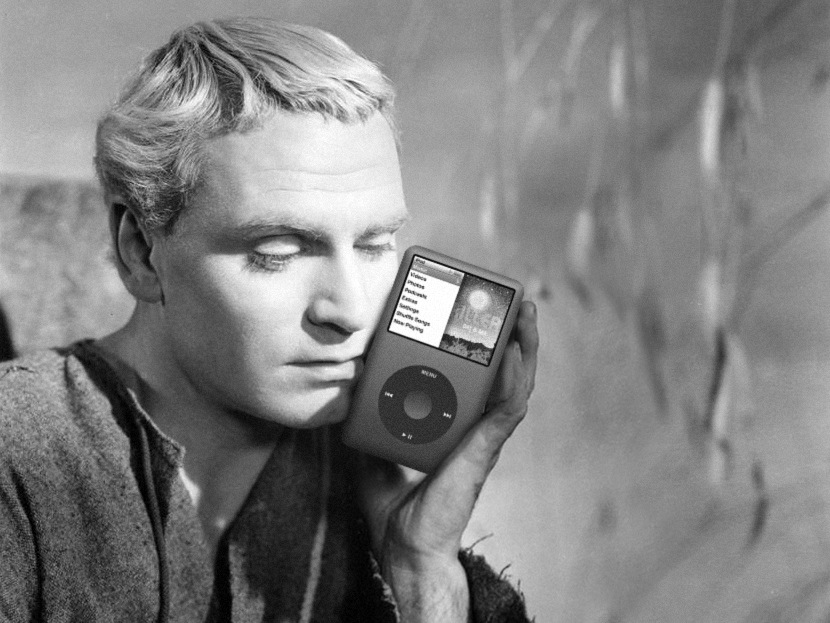Alas, poor iPod! We knew him, Horatio: A lament for Apple's music player

Alas, poor Yorick! I knew him, Horatio; a fellow of infinite jest, of most excellent fancy; he hath borne me on his back a thousand times; and now, how abhorred in my imagination it is! My gorge rises at it. Here hung those lips that I have kissed I know not how oft. Where be your gibes now? Your gambols? Your songs? Your flashes of merriment, that were wont to set the table on a roar?
- (Hamlet Act V Scene 1)
The writing is on the wall, and has been for some time: The iPod is on a downward slope. Apple saw a sharp year over year decline in iPod sales - down 52 percent, from 12.7 million iPods sold to 6.05 million. This isn't the first quarter that iPod sales have dropped precipitously, either. What's going on?
Fair is my love, but not so fair as fickle
Apple's just-reported quarter ended in December, so that included holiday sales. It's understandable, then, that Apple saw a sharp uptick in iPod sales compared to the quarter before. But the trend is clear when you compare the 2013 holiday season to 2012: people just aren't as interested in iPods as they once were.
And why should they be? More and more people are carrying iPhones and other smartphones in their pockets, which can play music just fine. Sure, the iPod touch works with the same apps as the iPhone. But the iPod touch costs $229, which is more than many people will pay for an iPhone 5c on contract.
Apple's other iPods, the shuffle, nano and classic - all offer different storage capacities and price points, at $49, $149 and $249 respectively, but with more limited functionality: The iPod shuffle can only play music. The iPod nano has an FM radio and other functions, but lacks Wi-Fi or downloadable apps.
Then there's the iPod classic. The venerable iPod that started it all, back in 2001. The Click Wheel iPod is an anachronism - a physical hard drive inside, with a small screen. Apple's kept the device just barely on life support, a moribund legacy product that has gone untouched for several years.
For $249, the iPod classic can store 160 GB of music, which is fine if you have a big music library, or want to take videos with you and watch them on a small screen. But even Apple itself has pushed its customers towards relying on cloud connectivity with iTunes in the Cloud and iTunes Match, services that help Apple make up for the limited storage capacity of most iOS-based devices by relying on Internet connectivity through Wi-Fi or, in the case of phones, cell service.
Not so vile a sin as self-neglect
And that really goes to the root of the problem: At least part of the decline in iPod sales can be blamed to Apple's own ambivalence over the product line.
Master your iPhone in minutes
iMore offers spot-on advice and guidance from our team of experts, with decades of Apple device experience to lean on. Learn more with iMore!
The iPod touch fifth generation model is getting pretty long in the tooth, too. It was first introduced in 2012, three months after the iPhone 5 went on sale, introducing a revamped seventh-generation iPod nano at the same time.
Apple followed up the following summer with a less expensive iPod touch that excised the rear-facing iSight camera and other features. Since then, however, the iPod line has gone untouched. It was something that raised eyebrows last September when Apple didn't bother to update them - something it's done almost every fall for years.
The clip-on iPod shuffle hasn't really changed very much in a while, either. You get 2 GB of storage for $49, small enough to clip to your shirt. But outside of changing colors, the iPod shuffle is still the same device that Apple's been selling since 2010.
Thou know'st 'tis common; all that lives must die
With over 6 million units sold in the holiday quarter, it's probably premature to declare the death of the iPod today. But the trend is definitely heading in one direction - the iPod isn't doing the business it used to, and, barring any major changes, probably won't.
But at the same time that iPod sales were faltering, the iPhone had another record-setting quarter. So did the iPad. The iPod's waning appeal may simply be an indicator of changing consumer tastes, and one that Apple's already compensating for by offering more appealing products with different functionality.
I, for one, still love the capacity of the old iPod classic. It's the only device besides a laptop big enough for me to transport my entire music collection, without having to resort to iCloud sync. But I don't love the click wheel or the old, busted interface - I'd much prefer to have an iPhone with all that storage capacity.
Until then, I'll settle for what I can get. But once Apple is able to get there, I'll join the exodus of customers who have moved exclusively to iOS devices and don't look back.
How about you? Do you still use an iPod, or is the iPhone enough? Let me know what you think in the comments.

